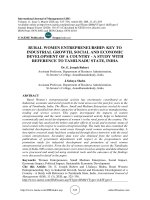Economic growth and economic development 273
Bạn đang xem bản rút gọn của tài liệu. Xem và tải ngay bản đầy đủ của tài liệu tại đây (123.48 KB, 1 trang )
Introduction to Modern Economic Growth
At first sight, the recursive formulation might appear not as a great advance
over the sequence formulation. After all, functions might be trickier to work with
than sequences. Nevertheless, it turns out that the functional equation of dynamic
programming is easy to work with in many instances. In applied mathematics and
engineering, it is favored because it is computationally convenient. In economics,
perhaps the major advantage of the recursive formulation is that it often gives
better economic insights, similar to the logic of comparing today to tomorrow. In
particular, U (x, y) is the“ return for today” and βV (y) is the continuation return
from tomorrow onwards, equivalent to the “return for tomorrow”. Consequently,
in many applications we can use our intuitions from two-period maximization or
economic problems. Finally, in some special but important cases, the solution to
Problem A2 is simpler to characterize analytically than the corresponding solution
of the sequence problem, Problem A1.
In fact, the form of Problem A2 suggests itself naturally from the formulation
Problem A1. Suppose Problem A1 has a maximum starting at x (0) attained by the
∗
optimal sequence {x∗ (t)}∞
t=0 with x (0) = x (0). Then under some relatively weak
technical conditions, we have that
∗
V (x (0)) =
∞
X
β t U (x∗ (t) , x∗ (t + 1))
t=0
= U(x (0) , x∗ (1)) + β
∞
X
β s U(x∗ (s + 1) , x∗ (s + 2))
s=0
∗
∗
= U(x (0) , x (1)) + βV (x∗ (1))
This equation encapsulates the basic idea of dynamic programming: the Principle
of Optimality, and it is stated more formally in Theorem 6.2.
Essentially, an optimal plan can be broken into two parts, what is optimal to
do today, and the optimal continuation path. Dynamic programming exploits this
principle and provides us with a set of powerful tools to analyze optimization in
discrete-time infinite-horizon problems.
As noted above, the particular advantage of this formulation is that the solution
can be represented by a time invariant policy function (or policy mapping),
π : X → X,
259









